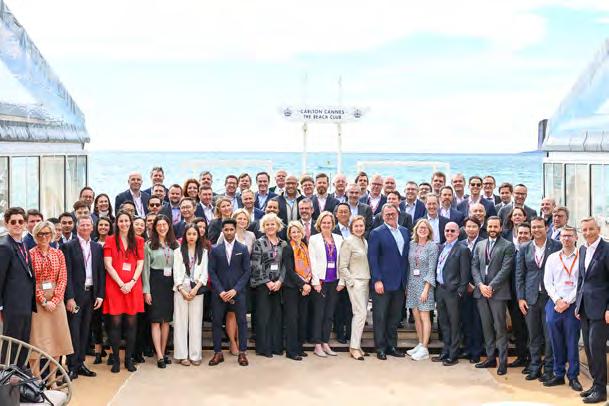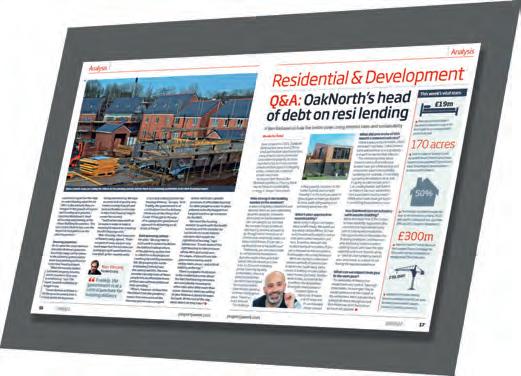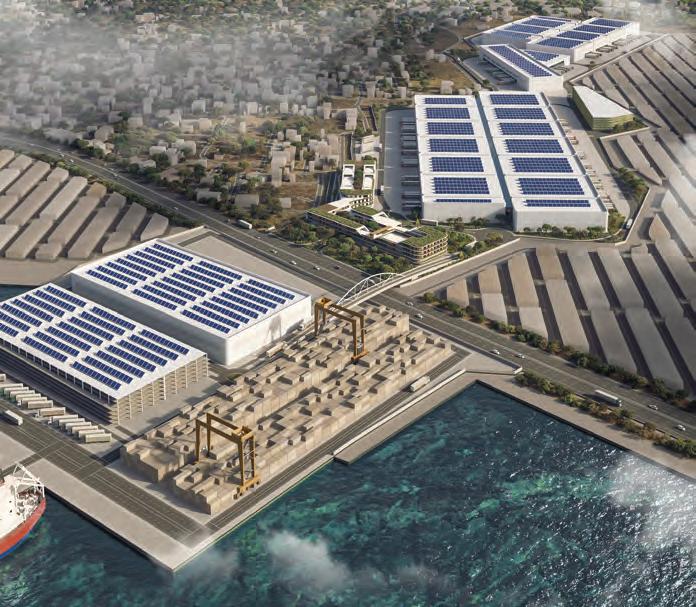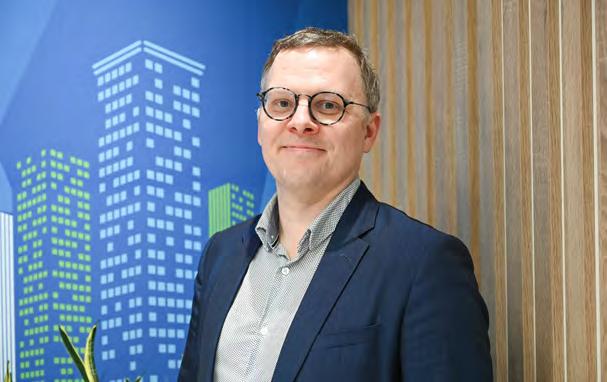




















04 NEWS
xxxxxxxx
ENERGY:
Investors and users unite around consumption goals
DIVERSITY: Industry rises to equitable workforce challenge
All the session details, expert speakers, conferences and events, to help you plan your time at MIPIM and make the most of the latest research, insights and debate

SPOTTED AT MIPIM
Do they know it’s Christmas? Blachere Illumination put delegates in a festive mood with their glowing bear. From left: Benjamin Nguyen Qui, Mehmet Soltay and Johan Hugues

Taille minimale en HAUTEUR s 2
Advertising contact in Cannes Maryam Grandela maryam.grandela@rxglobal.com
RX France, a French joint stock company with a capital of 90,000,000 euros, having its registered offices at 52 Quai de Dion Bouton 92800 Puteaux, France, registered with the Nanterre Trade and Companies Register under n°410 219 364 - VAT number: FR92 410 219 364. Contents © 2023 RX France Market Publications. Printed on PEFC certified paper







Holmströmgruppen’s operations are divided into three areas: ownership and management of properties, project development in the property sector and holdings of private equity companies.
We are a committed and active property owner in selected markets and sees to take initiatives and expand in all business areas when suitable investment opportunities arise. Added value is created through actively and responsibly carrying out the ownership role.
www.holmstromgruppen.se





 Christophe Béchu, French Minister of Ecological Transition and Territorial Cohesion, met with Nicolas Kozubek, MIPIM Markets director, and Cristina Gamboa, CEO of the World Green Building Council, after cutting the ribbon on MIPIM 2023
Christophe Béchu, French Minister of Ecological Transition and Territorial Cohesion, met with Nicolas Kozubek, MIPIM Markets director, and Cristina Gamboa, CEO of the World Green Building Council, after cutting the ribbon on MIPIM 2023



In the 11 programmes installed in Morland Mixité Capitale, visitors can find offices, a covered market, a nursery, shops, a swimming pool, a spa and a gym, a 5-star hotel, a youth hostel, restaurants & bars, social and private housing, urban farming and an art gallery.
Functional and social diversity. Overall, some 5000 people cross paths in Morland every day.
Achitect : David Chipperfield, 2023 Laureate of the Pritzker Architecture Prize.






Your stands demanded attention, and delegates couldn’t get enough of the opportunities to connect, learn, meet and greet on day one of MIPIM 2023













Real estate is a people business, and MIPIM is the in-person event that makes connecting worthwhile
Our green maintenance contracts, which we’ve rolled out in Germany, lead to a 99.5 percent reduction in elevator maintenance-related carbon emissions compared to a traditional maintenance approach. We don’t just say so – that figure has been certified by TÜV Rheinland. By pairing the benefits of remote connectivity with an electric vehicle fleet, we deliver maintenance services with the lowest carbon footprint possible.

REAL ESTATE is at the centre of the radical transformation and rethinking required to address climate change in the future and the financial power behind the property industry needs to be used to enter a new era now, Professor Jeremy Rifkin said during his MIPM keynote speech yesterday.

In a wide-ranging presentation on the way humans need to adapt to dramatic environmental change, the international author and advisor said that the world was heading into another industrial revolution, in which decentralised communication, mobility and power distribution would reshape the way we live.
is shared and will also power transport and mobility,” he said.
Pointing to the $11tr of investment that has left the fossil-fuel industry in recent years, he said that this huge weight of money and the power of the pension funds and major investors behind real estate, meant that there was the capital available to make the necessary changes.
“This goes way beyond ESG, although that’s a start,” he said. “We have to work with, and adapt to, nature again.”
Rifkin argued that the distribution of information through the internet should be mirrored by a similar approach to energy, with fossil fuels replaced by locally-produced power from solar and wind, which could then be shared regionally and eventually across continents.
“We tend to think of real estate in terms of enclosures but instead we need to view it as open nodes at the heart of a completely distributed infrastructure,” he said. “We need to create a framework for this third industrial revolution, which can then be customised to each environment.”
But he warned that the current generation of real estate was not fit for purpose in a world where severe climate events and a resetting of the “hydro cycle” across the seasons had made weather patterns, especially rainfall, less predictable.
“Real estate will be at the centre of distributed infrastructure, whereby it will be essential to share communications and create an ‘internet of energy’ where power produced by the sun and wind
Rifkin also called for the younger generations in the real estate workforce to be given the tools to drive the transformation, embracing their “passion” to lead the necessary step-change in attitudes and approaches.
And while he emphasised the seriousness of the climate crisis and the need to act quickly and decisively, he also stressed that it is still possible to turn the situation around again.
“We can’t give up, but we can’t be marginal,” he said. “We need to move into a new history.”
“We need to move into a new history”
“We have to work with, and adapt to, nature again”































CHRISTOPE Béchu, French minister for ecological transition and territorial cohesion, welcomed MIPIM’s resurgence after the COVID-19 crisis, describing it as a “precious opportunity for real estate professionals to share solutions regarding the climate crisis”. Referring to the climate crisis as “the challenge of our generation”, Béchu outlined the immensely damaging impact it is likely to have on France – citing rising temperatures, increased sea levels, erratic weather and water shortages as a threat to the fabric of society and food security. “We are at a crossroads,” he said. “In the context of these serious challenges, the entire urban planning and building sector needs to innovate. The problems we face are daunting, but I am convinced we can all learn from each other.”

Béchu acknowledged that higher inflation and increased interest rates make the task facing the real estate industry even tougher, but he called on the sector to think about how to make the existing building stock more environmentally friendly. “Ninety percent of the cities
of 2050 are already built, so we need to think about making them more energy-efficient and resilient. We also need to ensure cities don’t spread too much and deprive us of green spaces. All of this goes hand in hand with a transition towards a low-carbon transport system.”
The minister stressed that his message is not anti-growth: “The environmental agenda doesn’t mean not building or not using land. People need homes, businesses need to expand. But it is about finding a way to keep building in a responsible way. We have to find a way to address the artificialisation of habitats that has occurred in the last 50 years.”
Béchu was mayor of Angers for eight years before taking up his current role. Tapping into that experience, he told MIPIM delegates that they need to “build a pact of trust with mayors”. Supporting the French government’s current emphasis on decentralisation of planning and building rules, he said: “We don’t know the reality onthe-ground in Paris. Different regions and departments need distinctive economic and ecological approaches.”
Financial advisor to Dormio on the acquisition of Havana, a Dutch holiday park business, from Roompot / Landal (30 parks).
Acquisition creating the third largest vacation park operator in the Netherlands.
c. €380M Office
Financial and real estate advisor to CA Immo on the sale of its Romanian office platform to Pavăl Holding (7 assets).
The biggest commercial transaction in Romania ever achieved at only a 3% discount to Book Value.
c. €400M
Residential Financial and real estate advisor to Starwood and Avara on the sale of a Finnish externally managed residential company to OCP and GIC (2,200 units).
One of the largest residential transactions in Finland ever.
cbre.com/investment-banking

€200M Student Housing
Financial and real estate advisor to Smart Studios (12 prime PBSA assets, 2,013 units) on its sale to Round Hill Capital / CPPIB JV.


The largest PBSA transaction in Portugal ever.
Come and visit us at the Majestic Beach Restaurant, Location C17.A
c. €700M Residential Financial and real estate advisor to Catella on the sale of a German and Dutch residential portfolio to ZBI Group (4,000 units).

The second largest cross-border European residential transaction.
CBRE offers clients a unique combination of deep real estate knowledge, global institutional investor distribution and advisory expertise across the spectrum of real estate investment banking activities.
Financial and real estate advisor on the sale of U Store It, a self-storage company with 6 standing assets and 4 developments, to Heitman LLC.

The leading self storage platform in Ireland.
€939M
Financial advisor to Basecamp Group (11 prime PBSA assets in 4 countries, 5,341 units) on its sale to Xior Student Housing.

The largest PBSA transaction in Continental Europe ever.
€600M Logistics
Placement agent outside of Germany supporting the international equity raise. Pan-European strategy with focus on established logistics markets.
£1.2B
Financial advisor to Menora on an up to 20% minority investment into Brockton Holding.
Unique office and life science platform in greater London area.
c. €1B Data Centre
Financial and real estate advisor to On Value and Aquila Capital on the structuring of a European data centre investment platform.
Creation of a leading data centre platform focused on European secondary cities.

SENIOR leaders from Ile-deFrance, the dynamic economic hub that surrounds Paris, used MIPIM to set out a strategic plan that aims to drive economic growth while hitting ambitious decarbonisation targets. Alexandra Dublanche, vice-president of Ile-de-France region and president of Choose Paris, told delegates that “potential investors into the region are taking their environmental commitments

seriously and we want to accompany them on that journey”.
Dublanche said the pursuit of economic growth and sustainability at the same time is not a contradiction. “They are not mutually exclusive. We can be appealing to international investors and also sustainable. Ile-de-France is a centre of innovation, and we are applying our expertise to find solutions. A lot of money is being spent on
removing carbon from transport and finding innovative ways to use industrial wastelands in new ways.”
Jean-Philippe Dugoin-Clément, vice-president of Ile-de-France, said the region first wrote an environmental plan in 2013 “but things have changed a lot since then. So we are in the process of creating a master plan to cover everything from mobility and housing to ecology and town planning. This new plan will provide clear guidance and standards.”
Dugoin-Clément said preventing further soil seal is a key part of the region’s strategy. Greater energy efficiency, sourcing food closer to home and a circular economy that targets zero waste are also priorities. “As with other regions, there are many challenges facing us. But we do have some inbuilt advantages such as a highly developed public transport system.”
Dublanche said that the region has
already started turning ideas into action. She cited the example of a new Equinix data centre, where the heat generated from the building will be used to heat the swimming pool for the Paris Olympics in 2024. Zalando’s new logistics centre near Paris is another example of how it is possible to generate jobs for the local economy while adhering to tough environmental standards.
THE REAL estate industry has made huge steps forward when it comes to energy efficiency, but must now confront
the issue of embodied carbon in buildings, Miguel de León Ortiz, director of Ortiz León Arquitectos has urged.
Speaking at the firm’s stand in the Road to Zero area of MIPIM, León Ortiz said that architects had a valuable role to play in tackling embodied carbon but added that it would require a joined-up effort by the entire industry.


“In order to do that, architecture has a very important role to play, but it cannot be just architects pushing for it — it has to be industry,” he said. “Operational net zero is achievable, but we have to strive to also achieve zero embedded carbon and that is much more difficult.”
Here, León Ortiz said that making the right choices when it comes to materials is vitally important, especially given that traditional
building materials such as steel and concrete are so carbon intensive in their manufacture.
“We have worked on the largest timber office building in Spain and we can also design whole residential buildings that are fully made up of timber,” he said. “Timber is one of the ways to achieve net zero embedded carbon.”
However, León Ortiz added that the use of timber products will not always be the right decision. “It’s not the only way and we have to be flexible,” he said. “We cannot make all buildings out of the same material. What we have to do is to apply the right solutions in the right locations.”
association
Professional regulation agency
COFECI is exhibiting at MIPIM with a message for the world, according to the association’s president Joao Teodoro Da Silva and the president of CRECI Sao Paulo, Jose Augusto Viana.
What message will COFECI bring to MIPIM?
The main message is the connection between countries and professionals. COFECI would like to showcase and connect Brazilian brokers to the world.
COFECI includes 27 regional councils it makes up the COFECI-CRECI System. COFECI´s participation in MIPIM aims to promote the country’s economic potential, with its organized real estate projects.
What services does COFECI offer its members/associates?
COFECI is a professional regulation agency whose main purpose is to
discipline the real estate activity in Brazil, protecting consumers. Participation in MIPIM gives its members access to new markets.
What are the main issues in the real estate market that you are trying to raise awareness about?

In Brazil, we are actively promote the code of ethics as a resource for professionals. In terms of marketing, any medium to large-scale real estate development would be promoted by the COFECI-CRECI System, as long as its developers protect the participation of brokers and real estate agents.

At this MIPIM, for example, we are showcasing Maraey, the Rio de Janeiro project. in addition to being the largest and best undertaking of its kind in all of Latin America, its developers are willing to protect professionals and companies licensed in the
COFECI-CRECI System during the sales process.

What should MIPIM visitors know?
It is important to highlight Brazil as one of the most promising real estate markets, with reasonable prices, potential areas to develop and a hospitable population.
As MIPIM annually brings together developers and real estate investors from more than ninety countries, we understand that participating in MIPIM introduces COFECI to the world of real estate investments and business.
We invite MIPIM participants to visit our stand (P-1 G2) to learn more about opportunities in our country.
Your personal invitation is for Thursday, 16 March at 4:30pm, to learn about Maraey Project, Rio de Janeiro, Brazil. It’s worth getting to know it!

The Brazilian real estate
is at MIPIM in Cannes to build a bridge with investors that are curious about the country’s opportunitiesJose Augusto Viana, CRECI São Paulo Joao Teodoro Da Silva, COFECI
The Italian market in 2023: trends and perspectives, opportunities and projects
market perspectives
exclusive investment opportunities selected for MIPIM case studies
A Networking Cocktail will follow the conference at the Verrière Californie
Leader’s Perspective Stage -Hi5 Studio

Cannes – Palais des Festivals, Leader’s Perspective Stage -Hi5 Studio March 15th, 2023, 17.00 – 18.30




The main Italian players will share their experience and will provide valuable insights into the Italian Real Estate market
Discover the best real estate investment opportunities in Italy


ON FEBRUARY 6, a magnitude 7.8 earthquake struck in southern Turkey near the northern border of Syria. This quake was followed just nine hours later — as people attempted to return to their homes — by a magnitude 7.5 quake some 95 kilometres to the southwest.
While Turkey is situated on the prominent Anatolian fault, probably the most active in the world, the 7.8 magnitude quake was the most devastating to hit the country in over 20 years. “It was centred near Gaziantep which is home to not only millions of locals, but many Syrian refugees and the humanitarian organisations dispatched to help them,” chairman of the board of Alkaş & HAN Spaces, board member of Turkish Real Estate Platform Gyoder and a member of the Turkish Council of Shopping Centres, Avi Alkas, said. “Eleven cities in total were hit, and more than 50,000 so far have lost their lives.”
In extremely harsh climatic conditions, rescue missions have continued to dig through rubble, and the casualties continue to rise, added Alkas, with further secondary collapses and widespread damage to infrastructure taking its toll.
“All thoughts now turn towards creating real housing solutions for the displaced, because the vast majority of survivors are still living in tents and containers and even on cruise ships. It’s important to rebuild quickly and safely, because otherwise the region could completely empty out,” he said. “There is a call for a new building code limiting structures in the area up to a maximum of four floors, as some of the older buildings were as high as 14 storeys, which isn’t safe in an earthquake-prone region.
“Industry leaders, public officers and other professionals are now holding webinars to discuss what lessons to take from this disaster. There is also talk ongoing about the threat to Istanbul and its high-density neighbourhoods, which are also at risk from future earthquakes and contain vulnerable structures.
“This is the worst test that has hit Turkey in decades and represents a challenge for the years to come. We must take better care of our country of 85 million people plus all the refugees that we help,” Alkas added. “This year we are celebrating 100 years of the Turkish Republic and the world’s gaze will be on us. A new study suggests that the replacement cost of the material damage amounts to as much as $35bn.”
Thankfully, the global real estate industry is already offering solutions. “We have had offers to build schools; both Korean and Chinese officials offering to develop a smart city and a medical city in the area; but the need for co-ordination is stronger than ever. To keep people in this region, we need to revive the living conditions with social infrastructure as well as rehousing locals.”
Turkey’s cause will be highlighted at MIPIM this morning at MIPIM, in the Verriere Grand Auditorium, when Alkas will address MIPIM delegates alongside the president of Gyoder, Mehmet Kalyoncu.
“A full Turkish delegation will return to MIPIM in the future as it is an important space for us,” Alkas said. “This year we will be missing some important friends and colleagues and morale is very low. But we need to create opportunity from crisis and I look forward to discussing ideas and solutions with the world at MIPIM.”

INVESTORS and portfolio-holders must use data to inform “active asset and portfolio management” or face falling values and occupancy, according to a leading thinker on real estate insights.
Natasha Patel, Avison Young’s UK head of innovation and insight, said that sound asset management increasingly requires powerful data and analytics tools to drive value and maintain portfolios’ appeal to tenants. Modern data tools allow managers to “really think about what is the best use of a building”, she added, including, where necessary, repurposing or retrofitting assets.


“There’s been a lot of change in the way assets are used over the past few years,” she said. “There’s far more data out there about people’s behaviour. It’s about having access to data and making that deci-
sion-making process transparent.”
In the past three years, Avison Young has developed and rolled out Avant, a major portfolio data analytics platform, which is now live in multiple markets and territories, including the UK, the US and Europe. The platform provides users with a wealth of asset and tenant data, as well as information to help inform investors’ acquisition decisions. This includes granular data, such as local demographics, transport links, access to public services such as hospitals and doctors’ clinics.
“This helps investors identify assets for investment opportunities,” Patel said. “The data Avant provides allows asset managers to make strategic decisions. There are different tools to help with those decisions. Data is meaningless unless you can get someone to interpret it.”
THE REGION of Murcia in the south of Spain is primed for development following the completion of key infrastructure projects, according to Fernando Ballesta, director of foreign trade, investments and industrial infrastructures at the Instituto de Fomento de la Region de Murcia.
Speaking at the Spanish Pavilion, where Murcia’s delegation was bolstered by the presence of regional business minister María del Valle Miguélez Santiago, Ballesta said that a high-speed train connection to the region was only inaugurated in December and that Murcia airport opened just five years ago. As a result, Ballesta said that Murcia was now in a good position to expand its already flourishing tourism industry and build on its existing strengths in the industrial and
logistics sectors. “We are trying to attract hotel development,” he added. “We want more hotel chains to come to the region and have a portfolio of 36 [sites] ready for development.” Indeed, there is now no good reason why Murcia should not become as successful as its neighbours to the east and west. Murcia has 250km of beaches, its hinterland mostly agricultural, with orchards, olive groves, vineyards and medieval villages. “It’s a beautiful region,” Ballesta said. “If you have visited Spain and been to places like Barcelona and the Costa Brava or Malaga and the Costa del Sol, they’re fully developed. But you can really develop more here. These are the last places that you can develop in the Spanish Mediterranean. It’s a big opportunity.”
ANDREW Coombs, CEO of business park owner Sirius Real Estate, is in Cannes to engage with key partners, meet new people and, crucially, read the mood.

“One of the biggest challenges in the market at the moment is uncertainty,” he said. “One minute things are going in one direction, then they are going in another. It’s on the bus, off the bus.”
Coombs is keen to make the kind of assessment that can only be done by talking to people face to face.
“We are realising the advantage from our shareholders of being able to pivot quickly into the changing themes that we are seeing in this post-COVID world,” he said. “The market that is really thriving is the small-office outof-town market, where people are hiring a one-, two- or three-person office on the edge of town. That market has increased substantially and is still growing.”
















As
KAJIMA Europe, a company which works with governments and businesses to develop, invest in and manage assets, is intensifying its focus on urban town-centre regeneration.
“We are talking to people about different ways of investing — particularly social impact and environmental investments — to see if there’s a different way to do regeneration projects,” said Kate Pix,

regeneration director at Kajima Partnerships.

“We are looking at public partnerships and how we can work with the public sector to utilise land and create a real difference to areas,” added Tamsin Traill, regeneration director at Kajima Europe. Kajima is part of a £500m (€567m) joint venture with Newcastle University called The Campus for Ageing and Vitality. The project
will transform the former general-hospital site in the west of Newcastle into a 29-acre (11.7 ha) mix of specialist housing and research buildings, providing purpose-built homes that will enable people to live longer and healthier lives.
“Newcastle is a really good example of what we are focusing on,” Traill said. “One of the areas we are interested in is intergenerational specialist housing and how can you create a community that helps people age well in their homes and brings people together for enterprise and entrepreneurship.”
Another key regeneration project for Kajima is in the Merseyside town of Huyton, where it is supporting Knowsley Council’s 10-year plan to transform the town centre. Pix said that development and regeneration are inextricably linked with the political cycle and that the mood is currently cautious. “We just have to see what happens and react as best we can,” she said.
A TOKYO-based developer specialising in energy-efficient buildings is in Cannes with a range of sustainable developments designed to the highest Japanese ESG standards.
Tokyo Tatemono is the firm behind a number of ground-breaking projects, including the first zero-energy skyscraper in Tokyo. Director Hisatoshi Kato spoke to MIPIM News about some of his company’s achievements, notably delivering projects that meet Japan’s Zero Energy Building (ZEB) and Zero Energy Houses (ZEH) targets.

Tokyo Tatemono is currently engaged in an ambitious programme of delivering ZEH apartment buildings in Tokyo and further afield. These include the innovative Otemachi Forest project, which has entailed growing, transporting and
implanting soil from rural woodland on top of concrete to create a natural ground for tree planting. The company is also engaged in delivering sustainable energy-production facilities capable of transmitting power to the central Tokyo area, and disaster-prevention measures. Kato said: “High-efficiency district heating and cooling systems improve the efficiency of energy use. In addition, the buildings will be energy efficient through sensor-based air conditioning optimisation and the use of natural energy. Through these efforts we will reduce our environmental impact.”
Another project being led by Tokyo Tatemono is a major regeneration project opposite Tokyo Station. “Innovation is generated by the interaction of the people who gather in this area,” Kato said.
AFTER a period of strategic expansion by acquisition, Toronto-based CRE technology and analytics company Altus Group now offers what it calls “intelligence as a service” — helping the industry manage risk and improve performance throughout the asset and fund life cycle. Among Altus’ key acquisitions in 2021 were data and analytics firms StratoDem Analytics and Reonomy, and debt-management specialist Finance Active. “We are well positioned to help large CRE groups that recognise the need for better data, but have an appetite to outsource it,” said Julien Sporgitas, strategic client partner at Altus Analytics. The case for better use of data was reinforced by an Altus report. The Role Of Data Science In Commercial Real Estate Investing found 56% of companies in the US and UK were already investing at least one data science capability, including AI, machine learning, predictive modelling and algorithms.


LONDON-based 3D AI analytics company, Contilio, is at MIPIM to showcase its new service which has been created to help developers and builders track costs and measure sustainability accurately in their projects. The company was launched in 2019 and is focused on providing developers and building companies with the tools to track projects with Contilio’s analytic system which uses Apple LiDar and 3D images at scale, irrespective of how the data is captured. This fully automates the construction progress, installation quality and predictive risks for building and infrastructure projects. Debuting at MIPIM this year, Quantity Tracker is its latest platform, a product which not only helps provide in-real-time quantity surveying information to provide upto-date cost analysis but also provides information that can be used
to assess embedded carbon consumption. “While there is a lot of measurement of energy consumption, there is far less assessment of embedded carbon footprints, which is in fact a far larger area of sustainability,” said Contilio business development director Jack Li. “Our technology can be used to track not only new developments but also existing buildings, which means owners can benchmark assets within their estates.” Li said that the new platform is currently on trial with three clients, with further customers to be added to the pilot programme. Contilio works with a number of major development, construction and occupier clients and in late January signed a deal with Abu Dhabi-based real estate giant Aldar Properties for its construction portfolio, including its Saadiyat Grove mixed use development.


RESIDENTIAL landlords are failing to meet the growing demand for tenant apps and are losing money as a result, according to Erwin Buckers, CEO and co-founder of Chainels. The tenant-app company’s head of marketing, Melanie Waegeman, recently led a survey of 1,800 tenants
in the UK, the Netherlands and France, covering student, mid-market and high-end residential markets. Some 95% of tenants said they would find it useful to manage issues including maintenance and repairs reporting (39%) or tenant-to-landlord communication (32%) through
an app, but only 17% were already using one. However, the survey revealed that more than half (54%) of tenants would consider paying for such an app, providing a valuable opportunity for landlords.
“The survey shows that you can make more profit as a landlord by serving your tenants in a good way,” Buckers said. “You can monetise a lot of things in a building. That’s what more and more landlords will realise in the coming year.”
Chainels launched into the residential market last year. In January, it secured €3m in a Series A funding round to expand across Europe. The Chainels tenant app supports a diverse range of tasks from daily communication and reporting of issues to the booking of amenities, storing of documents and entering locked spaces within the property.
LANDLORDS are losing money by using multiple legacy systems to manage crucial tenant data, according to one of the directors of a disruptor real estate SaaS platform. Nisha Garigarn, vice-president for product and operations at New York-based ility, said that landlords who are using “lots of different systems” at once, in silo, could benefit greatly from consolidating their data management tools into one unified platform. “If they do consolidate the data it helps them to achieve their business goals such as ESG targets.” Garigarn is at MIPIM to meet new clients and potential systems partners to help develop, build and diversify the ility platform. Established in 2019, ility enables property owners to maximise profits by managing multiple tenant-related data streams. The firm now operates in the US, Europe and Australia, and, through partnerships, has been integrated with numerous real estate datamanagement tools.





THE REAL estate sector must understand that the era of new build is almost over, as the remodelling of existing stock becomes the primary driver in the market, according to Commerz Real CEO Henning Koch. He said that the creative mixing of uses and the combination of real estate and renewable energy would help define the future of property, with both urban centres and energy costs reaching crisis points. “Re-energising our city centres is a priority for the industry, because the dynamics of the workplace have changed dramatically since the pandemic,” Koch added. “In retail we have seen this already in the way in which retailers have adapted
and mixed their online and offline activity. Now the office sector is facing its own challenges.” Koch pointed to the decline in footfall in urban centres as people continue to combine working from their office and from their homes. Occupiers and landlords need to create more compelling reasons for people to come to the office “beyond a screen and a desk”, he added. This means that offices need to be configured with more amenities and facilities, and that real estate mixes need to be more imaginative in order to reactivate spaces. It also requires companies to think about wellbeing and
health — issues that until recently would not have been considered part of the real estate remit. On energy costs and consumption, Koch said that Commerz Real has a long history in identifying the important relationship between buildings, reducing energy usage and creating renewable on-site power. But the industry had been slow to adopt effective strategies. “You can put PV panels on a roof but that is not enough to power a whole office building. We need to take energy supply and stability far more seriously. Perhaps this current crisis will make the industry address this important challenge,” he said.
YESTERDAY saw Invest City
Focus bring together representatives from cities and regions around the UK to discuss what the different areas had to offer investors and highlight the importance of public/private partnerships. The panel session at the EG Pavilion also addressed the question of how the public and private sectors could work together to drive the green agenda. West Midlands mayor Andy Street reported that, in his experience, office acquirers in central Birmingham prefer a repurposed building to a brand-new building. “The question is, what are we doing to drive this market?’” he said. “We have a considerable amount of cash that we use to subsidise this market, both for homes and commercial development,
where there is a viability gap.”
Huw Thomas, leader of Cardiff Council, pointed to the Welsh capital’s council house-building scheme — one of the biggest in the country. “While all our coun-

cil house-building schemes exceed building standards, we have some specific pilot schemes that are achieving net zero, or even better than net zero, and are contributing back to the grid,” he said.

Looking at the south coast, Gavin Hall, Savills’ head of office and head of department for central south planning, cited the problem of nitrates and phosphates. “We are looking at the opportunity to put in reed beds and new oyster beds in the Portsmouth harbour special protection area,” he said.
Pam Smith, chief executive of Newcastle City Council, said the northern city was focused on a net-zero target of 2030. She added that Newcastle had been recognised as one of the world’s leading cities for tackling climate change.
Paul Simpson, chief executive of Derby City Council, said: “We’ve heard a lot this morning about young people and that is where these ideas have come from. They want to see buildings repurposed and our heritage looked after.”



THE UK is leading the way in terms of repricing and, as a result, should see recovery sooner than most markets, according to Tony Horrell, Colliers’ chief executive officer, UK and Ireland.
“Looking across the various markets, those that reprice the most quickly will be those that recover the quickest,” he said. “The UK is ahead of most other markets in its trajectory of repricing.”
Realistic repricing is necessary to stimulate demand, particularly in markets that have slowed or stalled, Horrell added.
“In the UK, it’s all about the economy because the economy brings confidence. There’s no simple solution and the market is doing the right things, but there has to be a repricing of real estate to get transactions going,” he said. Horrell said the past year had seen massive changes for the real estate industry: “A year is a long time in real estate. Last year, we were talk-
ing about the beginning of the war in Ukraine and that’s ongoing. We’ve also had a year of interesting changes in different market segments. Rising interest rates have also changed the dynamics and risks of real estate.”
The collapse of the UK division of Silicon Valley Bank at the weekend is causing nervousness, but Horrell does not believe interest rates will jump again. He also said there is cautious optimism in the market. “There is a positive intention for people to talk about positive things, though I suspect we will have to wait for later 2023 for things to turn around,” he added. Colliers, meanwhile, continues to expand. “We are a growth business and we will continue to grow,” Horrell said. “But we are a global company with a local heart, so the culture of how we grow is the most important thing. Getting the people piece right means that we can get the client piece right.”
Horrell has been CEO for the UK and Ireland since 2010. He is responsible for the direction and growth of Colliers’ UK business, which includes 16 offices.

BARINGS managing director Rory Allan is back at MIPIM “looking to source deals, close deals and reconnect with people we haven’t been able to see as much as we would have liked over the past two to three years”. Allan said every country and sector is different, with MIPIM providing an invaluable opportunity for investors to be able to tap into the sentiment of a number of varied markets. “I think we are starting to detect some more optimism than we were going into Christmas,” he said. “Q4 was a very tough quarter. Across the board transaction volumes fell off a cliff.

“The last couple of months we’ve been starting to see a little bit more optimism, a bit more deal
flow, a closing of the gap between seller aspirations and buyer aspirations.”
“We have seen a huge pricing correction but the structural fundamentals of the market are still very strong, so we are particularly focused on logistics and living for example, as well as ultra-sustainable offices. The underlying market there is very, very strong; vacancy is low, and tenant demand is fantastic for the right type of product.”
“It is still challenging but we are excited because there are some phenomenal opportunities. As a value-add investor we find these times of volatility when the market is maybe sitting on its hands a little bit — those types of conditions are fantastic for us.”
REAL estate businesses will need to focus on sustainability, ESG and the optimisation of their portfolios in the coming months. But those that have the right focus will do deals, said Stefanie Lütteke, associate partner and head of property companies at international consultancy Drees & Sommer.

Although activity in the residential sector had paused, Lütteke said there was still movement in the office and logistics sectors. Quality space is still being sought, she added, especially in big cities: “We have a lot of clients that are looking for high-quality spaces that are ESG compliant. As long as the demand is there, this crisis will not be as bad as it seems to be at the moment.”
Lütteke noted that many companies are still hiring. “So that’s another indicator that it’s not as bad as it appears,” she added. “There is still pressure in the market to spend money, so investors are looking for opportunities.”
Le Groupe Ficade, éditeur du magazine Décideurs, lance Décideurs Immo, un site entièrement dédié aux acteurs de l’immobilier d’entreprise et de la fabrique de la ville. Ce nouveau média a pour vocation de donner aux décideurs les clés pour mieux comprendre les enjeux actuels afin d’engager
ou d’accélérer la transformation de leurs modèles d’affaires. En mêlant exigence et mise en en avant des meilleures pratiques, Décideurs Immo a pour ambition de devenir le support d’une émulation collective, d’un désir partagé, favorisant la co-construction d’un avenir désirable. www.decideurs-immo.com

MONTREAL is at MIPIM to promote its real estate investment opportunities and learn from other “best-in-class cities” about creating mixed-use developments fit for the future.
The Canadian city is currently considering the best way to integrate a number of new developments within its limits, including the creation of an enormous commercial regeneration to the east of Montreal.
“For us, the key is to create a development that is right for the future,” said Daniel Mathieu, divisional chief of economic development for the City of Montreal.

“We no longer want to make cities that are oriented around the car and driving. Younger generations especially don’t want to go to offices or industrial places that have no amenities. We need to create mixed-use places that will work for these future generations.”
The local government authority also wants to develop a more sustainable plan for the city and is working with the official body for the greater metropolitan Montreal
area to align their ambitions.
“One of the key reasons for us to be at MIPIM is to learn as much as possible about how other cities around the world are tackling the same issues and to understand what best-in-class looks like globally,” Mathieu said.

The Chambre de Commerce de l’Est de Montreal estimates that there is more than 7.2 million sq m of vacant industrial land to the east end of Montreal, where there are currently 15 industrial parks. The urban area, which includes 11 boroughs, extends from the Jacques Cartier Bridge to the eastern-most extremity of the island. Transport infrastructure is being delivered via the REM de l’Est rail network, which will link three mixed-use real estate projects that together cover some 325,000 sq m of office and retail space, plus more than 10,000 new homes and apartments, scheduled to be built over the next decade. “We want to help create a city with a much better work/life balance,” Mathieu added.
BARCELONA and Catalonia are “open for business” with a raft of opportunities for real estate investment and development across all sectors, the Catalonia capital’s representative at MIPIM has said. A joint force of public and private partners is in town to promote the Catalan region, which is home to Spain’s second largest city, and its potential for investment in a host of urban and rural projects.
Xavier Mayo Torres, head of international promotion at Barcelona’s city promotion department, pointed to a number of major projects currently under way in the region, including one that is in the running for a coveted MIPIM Award. The 400 ha Parc de
l’Alba project in the Cerdanyola del Valles metropolitan district of Barcelona is the largest urban project in Catalonia and a finalist in the Best New Mega Development category.
Other ongoing projects include PDUAE La Plana de Lleida, a 1,300 ha development designed to stimulate logistics and other economic developments in the region.
The Barcelona-Catalonia stand is hosting events throughout MIPIM, aimed at highlighting the many investment and development opportunities on offer across the region. The delegation in Cannes consists of 24 private companies and 10 public bodies.
THE LEVEL of sale-andleaseback transactions is likely to increase significantly in both value and volume across Europe in the next 12 to 24 months as more companies look to take advantage of its benefits, according to Arvi Luoma, co-founder and CEO of specialist investment firm Blackbrook Capital. He added: “And we will see companies [build] sizeable portfolios of sale and leaseback in the millions and even billions of euros.”
Luoma noted that saleand-leaseback funding was one of Blackbrook Capital’s key planks at its launch three years ago and was now even more appropriate in the current economic climate. Blackbrook provides strategic capital to companies through sustainable ‘sale-leaseback and build-to-suit’ development financing. It also specialises in acquiring and developing future-proof supply-chain assets in under-served markets.








GERMANY-based student accommodation and co-living specialist International Campus is aiming to grow its circa 8,000-bed portfolio despite the current construction-cost uncertainty, with the focus on its core markets of Germany, the Netherlands, Czech Republic, Denmark and Austria. The company — 90% owned by investment giant Brookfield — had initially targeted a 10,000-bed portfolio, but CEO Gawain Smart said the potential is far greater, especially given the relative immaturity of the German market.
Founded in 2011, International Campus has been developing sites in Germany’s top seven cities and secondary locations, capable of housing student populations of at least 15,000-20,000. Smart said that purpose-built student accommodation (PBSA) currently only serves around 10% of the market.
“PBSA remains an immature sector in Germany and much of northern Europe compared with the US and
UK,” Smart said. “While there are bigger players in the UK, because of the relative maturity of the asset class there, our aim is to become the largest player in Northern Europe.” While the unpredictability of construction costs and interest rates means that International Campus is assessing opportunities carefully, Smart said that, in his view, PBSA combined the stability of residential with strong growth potential, as rents are not capped.
International Campus’ chief operating officer, Michael Stump, said PBSA works most profitably “at scale”. He added that, in many secondary markets, the company’s development was “setting the market” in terms of creating investment-grade product. In January, International Campus acquired of portfolio of five student apartment blocks. The deal comprised sites in Berlin, Frankfurt am Main, Hannover and Vienna.
THE REAL estate industry should stop focusing on the negatives of the economic climate and look instead to the opportunities, according to Professor Reinhard Walter, principal at FOM Real Estate.
“If you’ve got a good product and tenants, there’s no reason to devalue anything. The industry should talk about the possibilities, not the faults,” he added.
Walter said investing in quality, or improving the quality of existing investments, is key and that money is available to those that are concentrating on such improvements: “ Brave investors will still do something this year. People that wait too long, will be lost.”
HAMBURG-based real estate company IntReal is expanding parts of its business through its Luxembourg subsidiary, taking advantage of the Duchy’s more flexible regulation and the size of its investment-fund sector.
Stephan Schilken, newly appointed managing director of IntReal Luxembourg, said: “After specialising in real estate funds in Germany, we now want to offer products via Luxembourg that go somewhat


beyond this traditional business.”
IntReal aims to grow its fund-management operations, in particular expanding into infrastructure funds to take advantage of the explosion of solar- and wind-energy projects. It expects to receive a licence to launch these funds in April.
“The market potential, especially in the alternative-energy sector, is enormous. Moreover, there are many parallels between the asset class’ infrastructure and real estate. Both are cash-flow based and, for real estate investors, selling solar energy produced on the roofs of their buildings is also an attractive option,” Schilken said.
In Germany, IntReal has more than €60bn of funds in administration. It currently has €2.5bn in funds in Luxembourg, but aims to double this to €5bn by the end of 2023.
Businesses must also ensure they are properly prepared for the future, Walter said, citing FOM Real Estate’s recent early refinancing of the Maas Tower in Rotterdam: “We did it two years before we needed it, but we have secured long-term financing early. We faced [that decision] at the right time.”


Info en continu, interviews exclusives, décryptages, nouveaux formats...

Tout pour faire Le Point
Vous pouvez retrouver tous nos contenus sur :
Le site Internet Le Point wwww.lepoint.fr


L’application Le Point




THE SOCIETY of Industrial and Office Realtors (SIOR), headquartered in Washington DC, is at MIPIM to meet with its global membership and address the local and international issues that affect its 3,700 members in 45 countries.
For the SIOR leadership, there are two key trends: “Industrial is up; office is down.” The depressed office market is a direct result of the COVID pandemic and at this point “the status quo is not an option”, SIOR executive vice-president Patricia
Loveall told the MIPIM News. “The issues facing the office sector represent a challenge to our members and our task is to provide them with support. That element of the industry needs to be reimagined.”
But the society’s CEO, Robert Thornburgh, said there is room for optimism: “Building, design, everything is changing and those who are nimble and accept the challenges will be the winners. Our job is to educate, collaborate and assist our members over the next five or even 10 years to work through these issues and see them emerge stronger.”
Loveall added: “There is going to be a new look and feel in the office sector.”
On the industrial side, the disruption of supply chains is creating
new opportunities, with limitations on imports benefiting local manufacturers. “We’re seeing double-digit growth in 2023. We don’t see the market changing for industrial,” Thornburgh said.
SIOR’s European chapter president, Andrew Smith, added: “There are positive signs that recovering demand is bringing back industrial appreciation — certainly there appears to be competition again — and the occupier market has remained resilient, with many standout companies driving demand for land.”
Meanwhile, MIPIM remains an essential meeting place for the SIOR membership. For Smith, the event is “a natural stage for our members to make new connections and broaden our reach”.
“There’s nowhere else that brings together such a wide variety of people, companies and countries,” Thornburgh added. “We will see transactions happening this week. We always do.”







Norblin Factory is an award winning, landmark, mixed-use, urban regeneration project at the heart of Warsaw’s CBD. It has regained its presence on the map of Warsaw after several years of intensive design, construction and conservation work.
The multifunctional project has a total area of over 65,000 sqm. GLA of which 41,000 sqm GLA are A-class offices. Visitors to Norblin Factory can also enjoy unique cultural, entertainment and dining concepts including the original KinoGram cinema, the BioBazar organic market, the capital city’s largest food court Food Town and a museum commemorating the history of the site. Norblin Factory is an example of a world-class revitalization project implemented with respect for the environment. It's is a city-forming project, created in accordance with the idea of 15-minute cities. It has contributed to a positive change of this area in Wola district, which for years remained closed to the city and residents.
The real estate projects that are built must be truly urban – connected with the city, open to it, to its community, inclusive, offering complementary functions, bringing added value, proposing something new. And such is Norblin Factory. It is a highly successful mixed-use development that has energized visitors with its engaging mix of historical conservation and bold design concepts. We chose our tenants very carefully. Moreover, we established the Norblin Factory Foundation that continues the work of the former factory owners and support art and young artists.
Kinga Nowakowska Member of the Management Board / COO at Capital Park Group
INVESTORS must account for the carbon risk-profile of their portfolios or face suffering “zero rental growth” or even total obsolescence, the head of a major UK real estate fund has said.
Ben Sanderson, managing director for Real Estate at Aviva Investors, said that asset managers must take a far more active role in their stock than has historically been the case. “That passive style of asset management is a thing of the past,” he said. “You’ve got to make active decisions about where you’re going to invest — and you’ve got to have the asset-management skills to put assets on a net-zero pathway. If you don’t, you could end up
076_MARSEILLE_N1a2_PIM

with assets that are mis-priced, or have zero rental growth.”
Sanderson said that the risk of assets becoming stranded or obsolete due to rising standards of ESG was a further reason for fund managers to engage with their portfolios. “People have underestimated the danger of obsolescence,” he added. “Those investors who price carbon risks the best will outperform. It’s important that we embrace that. You can’t just buy-and-hold. Real estate is becoming more operational.”

Aviva has completed a number of deals over the past year, including the acquisition of residential property in the La Grip -
ia district of Terrassa, Catalonia, as part of its Spanish build-torent strategy. The ground-up development will place a strong emphasis on sustainability and include measures to maximise energy efficiency and minimise the energy requirements of the scheme’s 85 one-, two- and three-bedroom units, making them fit for the transition towards a low-carbon future. The company has also completed a major sustainability-driven refurbishment and retrofitting of an asset at 30 Golden Square in London’s Soho district. It has let three floors of the building to tech investor Highland Europe.
10.00 - 11.00
Building Tomorrow Stage - Propel Area (P-1)
Fishbowl - Smart cities vs Low Tech cities : quel modèle pour l’avenir de nos villes?
Conference in French without translation
12.45 - 14.45
La Mandala - Boulevard de la Croisette Déjeuner du Forum des Elus
CLOSED-DOOR EVENT by invitation only1
PARTNER STAGE Audi K (P4)
10.15 - 10.45 10.00 - 13.00
The Residential Workshop
10.00 - 10.45
Partnerships enabling early regeneration through impact projects
10.00 - 10.45
Energy crisis disrupting the real estate: industry impact and stakeholders agility
09.15 - 10.15
Trends in U.S. Real Estate and Capital Markets
09.45 - 10.45 Building the business case for decarbonisation of real estate
Sponsored by
11.30 - 12.00
Collaboration for a safer, more equitable and sustainable built environment
11.15 - 12.45
Italian real estate: growth embraces quality and uncertainty
11.30 - 12.15
Transport: Bridging the E, the S, and the G with mobility
11.30 - 12.30
Connecting occupiers and landlord to decarbonise
Organised by
09.45 - 10.40
Liege Metro Area: let’s build the future together! New ambitions, new ways of investing, new ways of living
11.00 - 12.45
Forum des Elus - Les Talks des Experts
12.30 - 13.30
Spanish Conference - Green Investment in Spain: sustainability and profits
Organised by
Sponsored by
Organised by
Sponsored by
CLOSED-DOOR EVENTS by invitation only1
10.45 - 11.40
Organised by
AAFH ARCHITECTE
11.45 - 12.45
Development opportunities in the Charleroi Metropolitan Area
Organised by Organised by
1. Only MIPIM team can issue invitations to this event | Sessions with a frame are the outstanding sessions
15.00 - 16.30
CLOSED-DOOR EVENT by invitation only1
17.00 - 18.30
The Italian market in 2023: trends and perspectives, opportunities and projects
Gold sponsors Silver sponsor
17.15 - 19.15
Equality of opportunities in Real Estate
Organised by
Sponsored by Knowledge partner
Sponsored by
14.00 - 15.00
Waste vs Reuse: Real estate’s role in boosting the circular economy
Harnessing Innovation to accelerate to net zero
Holistic ESG evaluation on Real Estate: filling the gap
Organised by Sponsored by

15.15 - 16.00
Water: Increasing cities and buildings’ resilience to scarcity and heatwaves
Sponsored by
15.45 - 16.45
15.45 - 16.45
Türkiye Relief Efforts
Organised by
17.00 - 18.00
Bio-sourced materials, Reuse: What Responsibilities, what Insurance?


Organised by
18.00 - 19.00
French architectures worldwide: Proclamation of the AFEX Grand Prix 2023 Awards
Organised by
Organised by
17.15 - 18.45
The ESG strategy towards better cities and stronger businesses
Organised by
1. Only MIPIM team can issue invitations to this event | Sessions with a frame are the outstanding sessions
imFokus Gipfeltreffen: Nachhaltigkeit & ESG
Am 30.03.2023 in Köln
Gesellschaftliches Umdenken und klimafreundliches Handeln in allen Belangen haben auch in der Immobilienbranche zum maßgeblichen Wandel beigetragen. Einer der Haupttreiber ist dabei Environmental Social Governance.
Themen im Überblick:
• Warum ist jetzt der richtige Zeitpunkt für eine Bestandssanierung?
• Welche technischen Herausforderungen erwartet die Branche bei ESG und was sind Lösungsstrategien?
• Welche digitalen Strategien, Tools und Grenzen hält die Digitalisierung für die Immobilienwirtschaft bereit?
Mehr Infos unter
www.immobilienmanager.de/imfokus-esg
 RM Rudolf Müller
RM Rudolf Müller

THE LEIPZIG region is back at MIPIM together with Invest Region Leipzig (IRL) and other partners, to reinforce its profile with investors, as “an innovative, vital location for business and liveability with great labour and demand potential”. Leipzig’s partners this year are the Kappis Group, the Arcadia Investment Group, the KSW Group and AOC | Die Stadtentwickler. Clemens Schülke, Leipzig’s Mayor for Economics, Labour and Digital Affairs, said: “In the last 10 years, the Leipzig region has developed into one of the most important business locations in Germany. Commercial areas with good transport connections, a high quality of life and unprecedented population growth have already convinced many specialists and investors to choose Leipzig as a location.”
IRL managing director Michael Körner added: “With its broad-


based economic and scientific structure, Leipzig has mastered the crises of the past few months well. And there is much to be said for continued growth in the future, from which the surrounding
area will also benefit. We are taking this positive perspective into account with numerous development areas that can be optimally staged at MIPIM.” Leipzig’s strong growth is supported by market data for 2022. According to analysis by BNP Paribas Real Estate, commercial investment in the local real estate market was €895m last year — 22% higher than the previous year. And with currently 625,000 inhabitants, it ranks seventh among the largest German cities. In the last 18 years, it has gained 28% more residents — with more than 17,100 women and men between the ages of 18 and 30 settled in the city.
At the German Cities & Regions Pavilion, Leipzig is exhibiting together with the city and region of Hanover and the Rhine-Neckar metropolitan region and is presenting the approaches to the subjects of Resilient Inner Cities and New Use of Fallow and Industrial Land.
THE FRENCH Ministry for Ecological Transition is tasked with overseeing and enabling government policies on the environment.
Focused on urban development and architectural policy within the two bodies, Yves-Laurent Sapoval said that real estate necessarily plays a key role in the country’s environmental ambitions.
“There will be no compliance with the Paris agreement without major progress in the building sector,” he said. “We need, immediately, to fully engage in this Road to Zero and communicate progress and results, at international level. Solutions exist.
“We urge professionals to join the ACT (assessing low carbon transition) frameworks developed by
ADEME and CDP especially for real estate and the construction industries.”
The Ministry supports the real estate industry in three complementary ways: “First by setting a long-term vision and a clear path for the decarbonisation of the buildings sector in France — in partnership with all the actors; secondly, by putting in place co-ordinated policies, regulations and incentives; and thirdly, by driving international co-operation and ambition to decarbonise and increase resilience of buildings,” he said.
Sapoval spoke on the panel for the MIPIM session International Co-operation For Sustainable Buildings: A Strong Driver For An Emerging Market.
THE INTERNATIONAL Agency for Research on Cancer (IARC) was established in 1965 by a resolution of the World Health Assembly as an agency of the World Health Organization. It is the global agency of the United Nations that works for the prevention of cancer. At the end of 2022, it moved to the Nouveau Centre building in Lyon’s Biodistrict. Developed by Demathieu Bard Construction and designed by ArtBuild Architects and Unanime Architects, the 13,565-sq m project is the result of a competition for the construction. The building is organised around a large circular open-air patio with a landscaped open-ground garden. The use of solid wooden elements is a major feature of the courtyard facade. Passive solar protection is provided by photochromic glazing that becomes darker and less transparent to reveal organic patterns. Carved into the five-storey monolith are two “urban windows that provide a glimpse of informal meeting places in the institution”.




















HBD AND Barings began work at the start of the month on Momentum, an industrial scheme in London that will ultimately deliver 380,000 sq ft (35,000 sq m) of carbon neutral, BREEAM ‘excellent’ space.

Located in Rainham, East London, the scheme will deliver four units from 41,126 to 171,406 sq ft. The units are being brought forward speculatively, demonstrating confidence in a market where supply remains constrained. The carbon neutral development has been designed for low-energy consumption and maximum efficiency, with solar panels covering all available roof surface, EV charging facilities, an EPC A-plus rating and intelligent building systems.
Adrian Schofield, senior director and head of region at HBD, said: “Carbon neutral and with an EPC A-plus rating, Momentum is one
of London’s most exciting new industrial schemes. We know that occupiers are looking for sustainable space that meets their responsible business and ESG obligations, while allowing them to ensure that they are attracting the best talent.”
Paul Smith, director, UK Asset Management at Barings, added: “Momentum will be a best-in-class
logistics asset, benefitting from excellent links into London and to the south coast of England. “Featuring high environmental credentials, a focus on wellbeing and an improved public realm for the community to enjoy, Momentum is reflective of the types of assets that Barings seeks to develop directly or through joint ventures.”
TELFORD Homes and a joint venture (JV) between Ridgeback Group and Angelo Gordon have announced the completion of a £300m (€340m) forward-funding deal to deliver three built-to-rent (BTR) schemes in London.
The deal will provide more than 750 BTR homes across three sites: Capital Interchange Way in Brentford,

Mill Road in Ilford and the former Metroline Bus Garage in Alperton.
The JV will forward fund 223 BTR units at Capital Interchange Way, which is Telford Homes’ first BTR project in Brentford and will include 45,000 sq ft (4,000 sq m) of commercial and retail space and 197 affordable homes.
The development will also include a
residents’ gym, lounge and co-working space spread across the ground and top floors, as well as gardens and terraces above a first-floor podium. At Mill Road in Ilford, meanwhile, the JV will forward fund all 239 new homes in the BTR development, which includes 162 BTR homes, 55 discount market-rate units and 22 London-living rent (LLR) apartments alongside more than 4,000 sq ft of residents’ amenity space.
Charlie Weatherill, capital markets director at Telford Homes, said:
“We’re delighted to be working with Angelo Gordon and Ridgeback on these three developments, which will provide much-needed build-torent homes.
“Angelo Gordon and Ridgeback share our vision to create high-quality, sustainable rental communities that will deliver enduring value for communities, residents, and investors.”
LONDONMETRIC has sold seven long-income assets for £33.9m (€38.28m), reflecting a blended net initial yield of 4.5%, an internal rate of return of 10% and 28% profit on cost.
The assets, which generate £1.4m in rent, include a 19,000 sq ft (1,700 sq m) Aldi store in Weymouth, sold for £6.8m, which LondonMetric developed in 2021 at a cost of £5.1m, as well as a 53,000 sq ft urban warehouse let to Restore Scan in Salford, sold for £6.6m, which LondonMetric acquired in 2016 for £4.7m. Other assets include a 42,000 sq ft self storage unit in Oldbury, sold for £5.7m, which LondonMetric acquired in 2019 for an allocated price of £4.2m, and a 16,000 sq ft Premier Inn in Ringwood, sold for £8.65m. Andrew Jones, chief executive of LondonMetric, said: “With the investment market strengthening over past months, we have taken advantage of this improved liquidity to sell down some of our more mature long-income assets.”



















A REGULATED stock exchange dedicated to IPOs and the trading of commercial real estate could provide real estate owners with a way to raise equity amid higher and more volatile debt markets.
IPSX, which runs real estate platforms for retail and professional investors, launched in 2019 and on the eve of MIPIM signed the fourth company to its portfolio, adding a £229m (€260m) portfolio of seven private equity-backed warehouses managed by M7, bringing the total value of traded properties on its exchange to circa £600m.

CEO Roger Clarke said that IPSX provides a way for property owners to bring single assets or small portfolios to the investment market and, for those interested in trading in real estate, it represents an “opportunity to democratise commercial property investment through fractionalised ownership”. The exchange works by allowing a real estate owner to launch an IPO on the platform, offering up all or some of the value of an asset to be
traded. Currently all four companies participating — The Mailbox, Birmingham, Bridgewater Place, Leeds and a portfolio of 17 small warehouses owned by M7 Regional E-Warehouse REIT — are on IPSX Warehouse, designed for professional and institutional investors.
“We created IPSX to give people
and companies the chance to invest and trade specific assets. For the owners it provides a way of raising equity on particular buildings or estates and for active investors it provides a way of picking out particular properties instead of the whole portfolio of a REIT, or an open-ended fund,” Clarke said. As the retail platform — IPSX Prime — develops, Clarke hopes that, for example, residents of Birmingham will be keen to invest in a landmark asset like The Mailbox, meaning they have partial ownership of important local properties. At MIPIM, the company is presenting itself as an effective way for real estate owners to generate equity to pay down debts or to reduce loan-to-value ratios as financing is renegotiated amid a climate of lending caution and higher interest rates.
“One important aspect is that the values are against specific buildings, so you do not have the issue of shares trading at below net asset value, as you might with a REIT or property company,” he added.
INTERNATIONAL consulting company Real IS continues its European expansion with the opening of its first office in Ireland, which will open in Dublin this summer.
It comes after the company launched a new residential fund focusing on Ireland. “If we have more than €500m of assets in a country then we go in and with residential it’s necessary to have people on the ground,” said Real IS CEO Jochen Schenk.
Real IS currently has €13bn of assets under management operating across five European offices. “We have invested from Finland to Portugal,” Schenk said.
The company is in the midst of a long-term transformation project
which will take Real IS to 2030, with key focuses on digitalisation and ESG. “The market will change and we are preparing things inter-
nally to get there,” he said. Schenk is also vice-president of the German real estate association ZIA where he has a key focus on ESG.
RESIDENTIAL-led real estate fund manager, PfP Capital, is at MIPIM to discuss new ways to attract the private sector to build “quality homes”, according to Catherine Webster, PfP’s CEO.


“We have a supply issue in the UK, so we are trying to encourage traditional housebuilders to create a pipeline for the kinds of homes we want to provide,” she said.
“Some developers might be slowing down, but we can forward-fund stock and they don’t have to pay for sales and marketing. We can do mixed-tenure properties for example, that combine market value and social value real estate.”
Webster described the group’s business model as “unique”. “We’re the only FCA-regulated fund that’s owned by a housing association. Our parent is Places for People, underlining our strong social purpose.”
PfP Capital currently has around £600m (€680m) under management across its three existing funds and a significant growth pipeline.




Immobilien Magazin is the leading B2B magazine covering Austria's real estate market. Read by 9 out of 10 market professionals, we reach all the right industry players. If you are interested in taking advantage of Austria's business potential, Immobilien Magazin is the gateway to connecting with prospective clients and partners.


 Georg Panholzer, Publishing Director
Georg Panholzer, Publishing Director
+43 1 25 254-10 I g.panholzer@imv-medien.at










www.immomedien.at

EXPERIENCE as tenants renting in Copenhagen led to the setting up of the Hococo service and communications platform. At its heart is a Tenant Relationship Management system, paid for by landlords with tenants in mind, as Hococo CEO William Shaw put it, to reduce the friction that can occur between the two sides.
He cited his own experience moving into a new apartment and flooding the kitchen when he turned on the dishwasher. “When I called to get help, all I got was a message saying something like, ‘Please call on Monday between 1 and 3pm’.” That led he and his co-founders to build the case that “loyal and happier tenants” can improve return on investment for owners and landlords. Hococo has now established a firm base in the Nordic countries and has a foothold in UK, working with property companies including Patrizia and Nrep.
With 10,000 apartments on the system, user experience is
providing good feedback to improve and develop the system, Shaw said.
The aim is not just more effective property management and transparency, through such things as smart FAQ’s for tenants (videos, links, etc) and digital document storage, but replacing ad hoc communities linked by WhatsApp or Facebook with a
full-service platform which can develop new apps, like booking tickets for users.
Attending its second MIPIM, Shaw credited the market for helping establish Hococo’s links with business beyond Denmark. “It’s here that you can get to know one another, find out the hot topics and engage with the wider market.”
PROPTECH firm Alasco is attending MIPIM to highlight the benefits of its new environmental, social and governance (ESG) reporting functionality.


Benjamin Guenther, the founder of the Munich-based company, said that the move from providing purely financial data services to incorporating ESG metrics had been prompted by customer feedback that stressed the increasing importance of environmental sustainability in particular.

“You can analyse whole portfolios to see where they are in terms of ESG and automatically get recommenda-
tions for what to do in your portfolio,” he said. “We show them what they have to do over the next years to extend [the life of] a stranded asset.”
He added: “It was driven by customers and of course driven by us asking ourselves what we can do to also have a positive impact on climate change.”
This year, Alasco has taken space at MIPIM alongside the City of Munich, which Guenther said had already been beneficial.
“It is really super helpful to have one location where people can find us,” he said. “The Munich stand is quite attractive for people.”
COMPANIES across Europe are planning to expand their last-mile logistics space to meet the ongoing acceleration towards ecommerce, according to a survey of 600 businesses by Mileway, one of Europe’s leading lastmile logistics real estate companies.
The research, conducted at the end of January, shows that 98% of businesses surveyed now sell online, compared to 82% in August 2021. This push to incorporate ecommerce is having a direct impact on space requirements, said Mileway. Over three quarters (77%) of the companies surveyed are planning to increase the amount of last-mile space they rent — either by upsizing, adding locations or both. This is up from 60% in August 2021.
Mileway CEO Emmanuel Van der Stichele said: “These results show that the shift to online has continued, even as Europe has re-opened following the end of COVID-based restrictions. This is continuing to drive demand for well-located properties near urban hubs.”

ATENOR, the international sustainable real estate developer, has agreed a deal for the regeneration of the Westbourne Park Bus Garage site, West London, with joint venture partners Ascendal and YOO Development.

The triangular development site hosts the main depot for Tower Transit and RATP Dev’s West London bus operations. The plan is for the bus garage to remain in
operation but to be reconfigured to free up a 1.5-acre plot fronting the Grand Union Canal and the Great Western Road.
The development is expected to provide a residential-led mixeduse community that “will benefit from a unique canal and park-side location, as well as superb transport connections”, according to the project’s partners.
Announcing the deal at MIPIM,
Eoin Conroy, country director UK for Atenor, said: “This collaboration with Ascendal and YOO offers an exceptional opportunity to unlock the development of a high-quality, sustainable regeneration project in this part of West London. As well as underlining our commitment to grow and diversify Atenor’s London development pipeline, the opportunity is very much in keeping with our approach to building strong partnerships in order to deliver highly sustainable urban regeneration projects that deliver positive social and economic impact.”
Adam Leishman, chairman of Ascendal Group, added: “Today’s announcement represents a meaningful step towards creating a unique ‘city-village’ London quarter founded on the principles of exceptional design, connectivity and community.”

THE SOUTHERN Spanish city of Malaga is at MIPIM not only promoting investment and development opportunities within the metropolitan area as the city continues to grow, but also hoping to be announced as the location for Expo 2027. That decision will be made in June, said José Cardador Jiménez, town planning and housing general co-ordinator, Malaga City Council, who added that the city has benefitted from a long term plan driven by the local authority to develop its real estate infrastructure across in particular logistics, industrial, hotels and hospitality, while also broadening the private and social housing available. The proposal for the Expo site would cover 250,000 sq m of exhibition space and the proposed site

is next to the University of Malaga, the Malaga TechPark and Malaga’s Trade Fair and Congress Centre. The city is promising 5,000 cultural activities as part of the three-month event and estimates that it will attract 3.1 million visitors.
“Malaga is a large city and we have been growing steadily. So we are promoting Malaga as a place of museums and culture, plus technology expertise. And, as we continue to expand, we want to establish ourselves as the key city in the Costa del Sol region,” said Jiménez. Malaga is in its seventh year attending MIPIM and, beyond the promotion of its shortlisting for Expo, Jiménez said that at the Spanish Pavilion Malaga will be promoting itself as a “sustainable city of the future”.
MIPIM first-timer Stewart Connors is in Cannes to promote Measurabl’s ESG data management capabilities. “MIPIM is also a great opportunity for us to learn about the sector’s ESG requirements,” Measurbl’s EMEA sales director said.
Active across 90 territories, Measurabl’s software helps real estate clients take control of their ESG data, increasing efficiency and facilitating regulatory compliance.
“But automating the data-capture process is only part of what we offer,” Connors said.
“We have a team that helps companies devise a strategic roadmap towards net zero and a data-collection service that specialises in hardto-access data. We can also advise companies on portfolio investments.”
Aside from meeting regulatory requirements, “accurate ESG data has two key benefits to C-Suite”, Connors added. “It can help unlock funding for green initiatives; and give a competitive advantage by helping to attract better tenants.”

TURKU is the oldest city in Finland, but the beautiful Baltic port has ambitious plans to reinvent itself for the future, according to Niko Kyyänräinen, Turku’s director of economic and business development. “We’re in Cannes to talk to investors about some of the city’s bold new projects which include a 10,000-seater arena. Finland is on the edge of Europe, so coming to MIPIM is a great opportunity to talk about our plans and tell potential partners about our progress.”
Being a nearly 800 year-old cultural hub means Turku needs to take a sensitive approach to development, but “there are many interesting opportunities in the city”, Kyynäräinen said. “There are, for example, a lot of brownfields sites ripe for development. That is particularly the case around the railway line, where the arena will be built. So there are opportunities here.” The flagship arena project is 50-60% funded “so it is very well advanced”. In terms of usage, it will be home to sports events, concerts and possibly industry exhibitions. “One of the most exciting aspects is that it will also host esports events. The famous Finnish
gaming company Supercell is one of the project’s investors,” he said.
Kyynäräinen believes Turku’s development represents an intriguing opportunity for international investors.

“The arena is part of a larger plan involving a hotel and transport hub. And remember that we are at the heart of one of the world’s most beautiful archipelagos.”
Other projects of note include a development programme in the Kupittaa region of the city. “Turku is also a maritime centre, making the world’s big-
gest cruise liners. So that is of interest to investors,” Kyynäräinen said. “The city also has a dynamic biotech sector, so for anyone interested in investing here, Turku has a strong industry base and entrepreneurial spirit.”
Turku is a city that is taking its climate responsibilities very seriously. “The city aims to be carbon-neutral by 2029 and climate positive from then onwards”, Kyynäräinen said. “That is also the year when Turku turns 800 years old, so it represents an important landmark.”
CASTILLA-La Mancha’s geographical position in the centre of Spain — with Madrid at its heart — provides a strong case for inward investment, with the region’s major cities well connected by high-speed trains and road links, according to Luis Noé Sánchez, director, Castilla-La Mancha. Sánchez said that establishing a consistent presence at MIPIM has reaped benefits for the area as it showed potential investors and developers “certainty and predictability” through its attendance.
Castilla-La Mancha is well placed as a logistics hub given its location in Spain and has established a strong reputation across the industrial, IT and aeronautics sectors, aided by its transport links, he said. The region
also offers a range of incentives for inward investors, both for owner-occupiers and for speculative developers. Sánchez cited recent Chinese investment in warehousing facilities in the region as a good example of how Spain’s central zone has been able to attract international financing, despite the highly competitive environment both in Spain and wider Europe.
“MIPIM has proved very important for us to help establish relationships and networks. We believe that our combination of our proximity to Madrid, good links and availability of talent is a very strong proposition to bring to Cannes and to help us develop a wide mix of uses across the region,” Sánchez said.

CAR PARKING is entering a new era of development with opportunities for asset owners and operators, according to Philippe Op de Beeck, CEO of Apcoa, Europe’s leading car park management company. The change began with growing demand for digital services; the acceptance of automatic number plate recognition; and the growth of electric vehicles (EV). This has heralded a new wave of investment. “The accent is on electrification in all its aspects,” Op de Beeck said, boosted by rapid expansion of fast (DC) charging of EVs and restrictions on on-street parking in city centres. Apcoa sees the continuation of slow (AC) charging of EVs for longer-term off-street parking, and expects growth in use of parking sites for fast charging. Apcoa now has deals with the big charging companies including, Tesla, BP Pulse and Ionity, and aims to have 100,000 park-andcharge spaces by 2035.



GLOBAL hotel group Hilton predicts 2023 will be its strongest year of growth in France, with seven planned hotel openings, the highest single-year increase to its French portfolio. As well as continued expansion in Paris, Hilton is focusing on major resort destinations and provincial towns and cities, working with several local owners in France on a development pipeline that will more than double the hotel group’s presence nationwide.
Simon Vincent, executive vice-president and president, Europe, Middle East & Africa, Hilton, said: “We’re experiencing record growth in France, with 2023 set to be a historic high for hotel openings. As a key market for Hilton, we’re focusing on develop -
115_HAUFE_N2_PIM
ing hotels in regional French towns and cities, the south coast and continued expansion in Paris.
“We continue to leverage our award-winning brands to grow market share and capture increased travel demand, particularly as

France gets ready to host major global sporting events including the Olympic Games, Paralympic Games and Rugby World Cup.” In France, Hilton’s development plans will see 24 properties added to the current trading portfo -
lio of 23 hotels in coming years. Tapestry Collection by Hilton and Curio Collection by Hilton make up more than a quarter of upcoming hotels in Europe, ranging from island resorts to unique city hotels and historic buildings. In France, following recent openings in Hyères and Paris, Hilton is launching hotels under its collection brands in Bordeaux and Dijon, bringing Hilton brands to more regional cities across the country. In recent years, Hilton has also introduced new brands to the French hotel market, with the openings of Canopy by Hilton Paris Trocadero and Hotel Camille Paris Gare de Lyon, as well as DoubleTree by Hilton Lyon Eurexpo last year. Launching this summer, Canopy by Hilton Cannes will be Hilton’s first property in the city, boasting views of the Old Port from the hotel’s enviable roof terrace and an interior design led by designer Ramy Fischler.












JBC Média is the largest real estate and construction publisher in French Canada.
JBC Média est le plus important éditeur au Canada français, du secteur de l’immobilier et de la construction.
HOW CAN cities provide quality of life and healthy lifestyles in a post-COVID, global-warming world? That was the question addressed by Tuesday’s Healthcare workshop on the Asset Class Stage which featured a panel discussion, followed by roundtable conversations.
Michele Cecchini, head of public health, Organisation for Economic Co-operation and Development (OECD) began the session with a keynote outlining the scale of the challenge, and presenting some of the data and evidence that policymakers are considering when it comes to building more sustainable and healthy cities.
Cecchini said the population in
the OECD and European countries has grown significantly with the majority increasingly living in cities. The rise in numbers, he said, is down to people living longer rather than because of the number of births.
“When people get older they also develop chronic diseases that require care. One of the main issues is that they have multiple chronic diseases,” he said.
Often these diseases are preventable, he added, citing risk factors including tobacco consumption, high body mass index, lack of physical activity and diet.
“Many of these disease factors are shaped by the urban environment. How cities are designed and managed might have an

enormous impact on people’s behaviour and in the end on their health.” Pollution, non-optimal temperature, and opportunities for physical activity are significantly affected by the urban environment, he said. “So greening cities and making an active lifestyle an easy option are among the top priorities for action.”
Also speaking was Alessandro Sparaco, founding partner, Threestones Capital, a fund management company specialising in long-term care investments, managing around €2bn in assets under management across Europe, mainly in Germany, Italy and Spain.
He was joined by Jean-Pierre Hanin, CEO, Cofinimmo, which


CBRE has advised on the sale of the Pullman Cannes Mandelieu Royal Casino in Cannes, France, on behalf of Joa, a leading French casino company owned by Blackstone and Kings Park Capital. The hotel has been acquired by Posei-

don Hospitality, which is owned by Luminare and Unik Group. The four-star hotel features 213 keys. Built in 1981 it is one of the only hotels of its size in Cannes to offer direct access to the beach.
Sami Mendil, head of hotel in-
vestment properties, France at CBRE, said: “We are very pleased to have been able to complete this transaction in a complex context and to have made it possible to secure a favourable exit and a bright future for the hotel.

“The hotels team, combining the best of local and international expertise across CBRE’s European platform, has once again demonstrated its ability to navigate complex fundamentals and strategic subjects of major importance,” he added.
Poseidon Hospitality is expected to present ambitious plans for the hotel in the coming weeks. Joa, meanwhile, will continue its operation of the casino.
Laurent Lassiaz, CEO at Joa
Group, said: “The sale of the Pullman Hotel in Cannes Mandelieu marks the beginning of a superb development project for this unique site. With the future relocation of the casino within the new project, in a larger space, we plan to transform this venue into a flagship casino of the French Riviera, in addition to the complete renovation of its neighbour, the JOA Casino in Antibes La Siesta.” Unik Group’s Sylvie Maire Proia and Christophe Kadi, co-CEO of Poseidon said: “This acquisition completes our investment strategy in Europe by selecting prime real estate assets. The final project of this hotel will be ‘Unik’ with its new design and positioning.”
Bruno Bruchon, president, Luminare, said: “This transaction represents much more than a deal. This investment is a perfect illustration of our DNA: a new look, a wind of freshness, and even a little craziness.”














INDUSTRY stakeholders need to lead radical change if the UK is to meet its net-zero targets, according to a new report, The Land Use Challenge: Creating A System To Deliver Net Zero.

The study from UK law firm TLT and real estate consultancy Gerald Eve concludes that the UK needs to move quickly from ‘business as usual’ to a transition mode and highlights the vital importance of optimising land use. Competing land-use priorities, from renewable generation and green infrastructure to industry, affordable housing, food security and biodiversity, mean that issues related to constraints on the grid are one of the biggest
challenges to the UK’s efforts to achieve its net-zero targets.
The report concludes that investment in updating existing grid infrastructure and more grid balancing projects will be critical.
The current grid structure will need a complete overhaul to support the levels of renewable generation necessary to reach net zero and ensure UK energy security. Clear regulatory and policy direction is needed to incentivise grid infrastructure investment, and to clarify the weight and importance placed on renewable generation projects. The report also suggests that net zero need not be viewed as a cost liability, but rather as a business opportunity.
Commenting on the findings, Maria Connolly, head of future energy and real estate at TLT, said: “A comprehensive overhaul of the existing grid infrastructure is needed to support increased renewable energy generation, distribution, storage and


stability, and complementary technologies such as hydrogen electrolysis and carbon capture. Maximising land use is a critical part of this, to support the creation of a system that can deliver net zero.


She added: “Change is happening but not at the pace we need it to be. We cannot stand by and wait for a stable market and the ideal policy and regulatory landscape. We need to come together as an industry and be the voice for change.”
John Howells, partner, industrial and infrastructure, at Gerald Eve, said: “It is crystal clear that the UK needs to rethink how it optimises land use if it is to meet the government’s 2050 net-zero target. However, determining exactly which projects should be prioritised in an increasingly competitive landscape presents an enormous challenge to the industry.”

“Change is happening but not at the pace we need it to be”
TLT’S Maria Connolly

Infrastructure and real estate specialists are increasingly seeing their interests align, as they pursue renewable power opportunities

WHILE real estate investors and infrastructure investors used to sit at opposite ends of the table, issues such as the recent energy crisis in Europe have put them both on the same page.
Today, property landlords are increasingly infrastructure owners, with buildings playing a huge role in energy generation as well as consumption. But while both industries are increasingly singing from the same hymn sheet, an even further integration of interests is likely to be beneficial to end-users, experts suggest.
Germany’s Catella Residential Investment Management (CRIM), a subsidiary of the Stockholm-based
Catella AB Group, has been assembling a portfolio of buildings that generate electricity for its Catella Elithis energy positive impact fund (CEEPF). The firm recently acquired a 64-apartment project in Mulhouse, northeastern France, to be developed by its partner Elithis Groupe, the French sustainable engineering company.
Xavier Jongen, managing director, CRIM, says: “The development pipeline for our Elithis Fund is gaining momentum in the French market with this investment in Mulhouse. The European energy crisis has highlighted the affordability of these highly sustainable energy-positive buildings relative
to standard residential properties. “Tenants either pay very low bills or actually receive money back in the form of an annual bonus according to how effectively they manage their own energy consumption through a proprietary SmartApp, so increasing household purchasing power.”
CEEPF invests as a ‘dark green’ Article 9 impact fund, under the EU’s Sustainable Financial Disclosure Regulation (SFDR), in the low-carbon energy-efficient Elithis Towers, which produce energy from solar panels on the roofs and facades. Norway’s municipal and public health sector occupational pension company KLP, the country’s largest, and a group of Institutional investors, committed close to €100m in the first closing of the fund in early 2023. Thierry Bièvre, president, Elithis Groupe,



adds: “The increasing barriers to developing on greenfield sites in France and other European countries, means we need to both target brownfield locations when we can and also minimise the area footprint of new developments as efficiently as possible. That means focusing on energy-positive efficiency; household affordability and minimising impact on urban topography.”
CTP, the largest owner and developer of industrial and logistics space in Romania, is also investing in green energy. It recently an-
how many investors think about portfolio composition. Pan-European logistics specialist Infinium Logistics, which recently completed the acquisition of an EV charging facility in Banbury, UK from Paloma Capital, says that assets such as charging infrastructure are part of a strategy of “thinking outside the box”. Adds Tom Gough, investment director, Infinium Logistics: “We look forward to working with market participants to acquire additional circa fiveacre sites near major urban centres where we can develop specialised van-charging infrastructure that enable our tenants to transition to electric vehicles.”
Phil Bayliss, Infinium’s CEO of Europe says: “This addition to our growing portfolio encapsulates Infinium Logistics’ ambitions to decarbonise, electrify and optimise the last-mile delivery sector. This site provides critical EV infrastructure that will accelerate the transition away from ICE vehicles whilst also optimising and improving the operations of tenant Amazon in the area.”
nounced plans to install a 1.5 MW photovoltaic power station at its CTPark Bucharest industrial park in western Bucharest.
The plant will be developed by Enel X Romania, the Enel Group’s global business line driving energy transition, and comprises approximately 3,700 rooftop panels that will provide an average annual production of 2,100 MWh, with priority distribution to its tenants. Ana Dumitrache, country head, CTP Romania, says: “We are the first real estate developer with a rooftop PV station in Romania that is already operational. After the plugin of our first PV installation at CTPark Bucharest West, we are now constructing a new one, this time at CTPark Bucharest.”

In Romania, CTP owns class A warehouses spanning a total area of more than 2.3 million sq m in 15 cities and its ambitions include making more sites capable of generating power.
The energy question is affecting
Despite the positive trend, experts warn that society’s transition to renewables is unlikely to be fast or easy. War in Ukraine may have brought the issue of energy security on to the front page, but myriad challenges remain. The European Parliament recently succeeded in passing the Energy Performance of Buildings Directive (EPBD) but the legislation was tempered by a compromise. While all new builds are expected to have zero emissions from 2028, the use of gas boilers will no longer be phased out by 2026, but instead see their use tapered to 2035 or potentially 2040.
Josephine Tucker, managing director, clean energy and infrastructure advisory, JLL, says: “We can’t talk about energy security without addressing the matter of energy resilience — guaranteeing a stable and sustainable supply is not always easy. Renewables have a major role to play in diversifying energy portfolios, but microgrids and demand management solutions are just as vital role in balancing supply/demand and contribute to the com-
New research from State Street, which owns one of the largest asset custodian businesses in the world, seems to back up this trend. Its annual report into private markets allocations from 480 institutional investors shows that European funds see more opportunities in infrastructure than their counterparts in other regions. According to the data, some 56% of European institutional funds expect to be studying infrastructure opportunities, while just 38% of investors in the US are targeting the sector. 44% of APAC investors will focus on the sector, while 43% of Latin American funds think it has some merit.
Germany-headquartered global investment giant Patrizia launched its largest ever infrastructure strategy dedicated to APAC earlier in the year. The strategy is managed by Patrizia MBK Fund Management (PMBK), a joint venture between Patrizia and Mitsui, and will aim for overall assets under management of up to $1bn (€920m). The APAC region is forecast to contribute 60% of global growth by 2030, but has an estimated $900bn annual shortfall in infrastructure funding, according to the Asian Development Bank.

Saji Anantakrishnan, head of infrastructure for Australia and Asia at Patrizia, says: “As the world’s top growth region, Asia-Pacific is an extremely compelling proposition for investors thanks to its favourable macroeconomic conditions, as well as the growing supply-demand imbalance for strategic infrastructure investments.
“Governments alone cannot finance this transition, opening up enormous opportunities for private capital to shape the future development and prosperity of the region.”

“The European energy crisis has highlighted the affordability of these highly sustainable energy-positive buildings relative to standard residential properties”
Xavier JongenJLL’s Josephine Tucker




Improving diversity, equity and inclusion has been an ongoing challenge for the real estate sector, with Europe lagging North America, but several organisations are trying to make a positive difference
WHILE the global real estate industry is trying to address the issues of creating a more diverse, equitable and inclusive (DEI) workforce, there is still a long way to go.
From gender balance and ethnicity to disability, age and socio-economic backgrounds, attempting to reframe corporate ethos and, crucially, evolve with more diverse leadership teams is a huge challenge for an industry that started on the back foot.
There are an increasing number of initiatives and research studies aimed at quantifying and en -
acting change and late last year industry body INREV revealed the findings of its second Global Real Estate DEI Survey, in collaboration with Ferguson Partners and six other industry associations — ANREV, NAREIM, NCREIF, PREA, REALPAC and ULI — to track global real estate practices.

Out of 192 organisations submitting data to the DEI Survey 2022, 12.4% were from respondents with operations in Europe (privacy restrictions in Europe hampered the research, INREV says) and the key Europe -
an highlights include that firms are showing signs of increased sophistication on DEI matters. This is especially true of broadening initiatives aimed at increasing the representation of under-represented groups at the top levels, linking metrics such as compensation to outcomes, levelling pay disparities and facilitating inclusiveness.
All respondents reported that they are offering work/life balance programmes, which may include childcare and flexible work arrangements. Almost eight out of 10 European respondents give all employees the option to work remotely at least part of the week, higher than the global average of 61%.
Among respondents that have a formal DEI programme, more than 85% set qualitative and/or
quantitative or measurable goals, and, over the next 12 months, 11.1% that do not say they plan to do so. Anti-bias measures are important for recruitment and retention with a third of respondents planning to ensure managers receive training on anti-bias hiring within 12 months.
“Certainly the situation is very different from when I first joined the real estate industry,” says INREV CEO Lonneke Löwik. “There is much more awareness, there are much better recruitment processes in place and, post-COVID, companies

the US states. Secondly, privacy laws make it much harder for us to collect data, so the research is useful but it is not as complete as we would like it to be.”
Attempts to address the imbalance are emerging from a variety of different directions, from organisations including Real Estate Balance, headed by MIPIM veteran Sue Brown, to BAME in Property, led by founder Priya Aggarwal Shah as an organisation formed to encourage more ethnic diversity in the built environment sector.
There are also specific initiatives. London-based communications agency ING Media recently closed its first request for applications for Elevate, intended as an accelerator for emerging businesses run by leaders from ethnically diverse backgrounds. ING says that Elevate will provide PR consultancy on a pro bono basis to support business development and communications for the participants.
The ING Elevate programme was made open to companies in the built environment sector run by at least one leader from a diverse ethnic background, and up to 15 employees.
are more aware of the work/life balance. But having said that, there is still a long way to go.” In 2021, 79% of respondents were analysing pay gaps based on gender or planning to do so. The figure has risen to 85% in 2022. Europe leads this with 84% of respondents in Europe currently monitoring pay equity compared with 66.7% and 68.6% of Asia-Pacific and North American respondents, respectively. “DEI embraces so many elements, including age as well,” Löwik points out. “And while the US does appear to be ahead of Europe at senior level, it’s worth adding that firstly there is a greater difference between the approaches within individual European countries — and different drivers — compared with
“We have had a brilliant response, with more than 30 built environment firms applying. It has already been amazing to hear from so many interesting businesses and see the breadth of talent and expertise out there. We will be selecting participants over the next few weeks before starting with the first round of the programme,” says Roxane McMeeken, director, ING Media
“We hope that Elevate will contribute to improving diversity and inclusion in our sector and, along the way, to creating a built environment that is better designed for all the communities it serves,” she says. “Elevate will be a learning process for ING, and we will adapt and evolve the programme as we discover what works best.”
The challenges also extend to perception, according to Diversity Talks Real Estate (DTRE) director Andrea Carpenter, who believes that it is important for women and people from diverse ethnic backgrounds to participate on stage at events, not least as role models for younger generations in the audience.

“We have always maintained that visibility is very powerful. It’s not always easy to put yourself forward as a woman in a generally male-oriented environment, for example, but participation not only challenges stereotypes but it’s very empowering for a young woman attendee to see senior women speaking or on panels.”
Carpenter says that in her experience some women in the property sector can be reticent about putting themselves forward, although she says that this is changing, not least with most organisers keen to ensure diversity represented on their programmes, “something that was not the case even five years ago”. DTRE has been running training courses for women who want to become expert panellists at conferences and Carpenter stresses these are “a great place to start” for those wanting to take the first step.
And while the real estate sector has shifted significantly in its DEI awareness and prioritisation, INREV’s Löwick stresses that businesses must continue to promote their DEI agendas to ensure there is no slip backwards. “I feel positive, because when you look at the younger people entering the industry then it really is far closer to 50/50 in gender and more ethnically diverse. But we also need to look at ensuring that people come from different backgrounds, not all from the same areas or schools, to gain different perspectives,” she says. “And we need to make sure that whoever enters the industry is allowed the chance to rise to the top.”
“There is much more awareness, there are much better recruitment processes in place and, post-COVID, companies are more aware of the work/ life balance”
Lonneke LöwikING Media’s Roxane McMeeken INREV’s Lonneke Löwik




